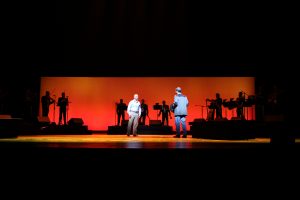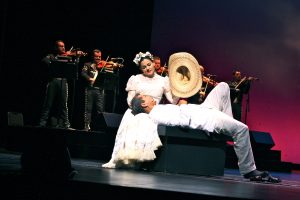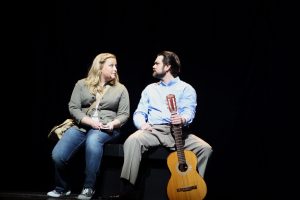Mariachi Opera: A New Chapter for San Diego Opera
Using the idiom and instrumentation of traditional Mexican mariachi music and recounted in a series of flashbacks, Cruzar tells a story of the destruction of a close-knit Mexican family in rural Michoacán whose father, Laurentino Velasquéz, goes north to work in Texas to support his wife Renata and son Rafael. But the absentee father loses his son’s respect, and Laurentino secretly raises another family in Texas.
The opera opens with Laurentino on his deathbed and his American son Mark and granddaughter Diana desperately attempting to contact Rafael in Mexico for a family reconciliation before the paterfamilias dies. Leonard Foglia’s story line of family conflict is just the type of plot that Verdi chose in his middle period—think of the estranged brothers in Il Trovatore—but Cruzar is not conceived in the mode of grand opera.
Cruzar is a compact one-act opera (like those perennial favorites Pagliacci and Cavellaria Rusticana) with the 13-member
Mariachi Vargas de Tecalitlán as the onstage orchestra arranged in a deep semi-circle behind the singers. Like The Magic Flute, Mozart’s beloved Singspiel, all the dialogue in Cruzar is spoken. Spanish and English dialogue alternates, with supertitles in the opposite language keeping everyone in this atypically ethnically mixed opera audience in the loop.I found Cruzar musically compelling. The heart-on-the-sleeve emotion of mariachi ballads was made for the drama of opera, and Martínez has packed his score with many glorious, heart-tugging solos, several powerful duets, and a grand quartet finale that pulls together the many themes of love, family, nationality, and loyalty that lurk beneath the surface of this story.
Having heard mariachis play in noisy, crowded tourist restaurants and at community gatherings, I had no inkling how subtle and opulent their sonority could be. Martínez’s violins radiated a warm, burnished line that filled (with the help of amplification) the Civic Theatre, and his orchestration proved consistently inventive. Let me say a word about amplification. This production used it in a subtle, unobtrusive fashion, not the overbearing, garish aural blitzkrieg that visiting musical productions inflict on their audiences.
Some voices stood out, including Brian Shircliffes’s powerful baritone, equally resplendent in a quiet folk ballad (which he accompanied on guitar) or in a fiery duet with tenor David Guzmán. The vibrant soprano Vanessa Cerda-Alonzo as Lupita could have dispensed with amplification, and soprano Brittany Wheeler as Diana displayed a vocal prowess of depth and ardor. Both Cecilia Duarte as Renata and Octavio Moreno as Laurentino relied more on their impressive interpretive powers to develop their characters.San Diego Opera described this production as “semi-staged,” so Foglia’s efficient direction gets a simple “pass” rather than a C-minus. Brian Nason’s evocative, dramatic lighting, however, compensated for the bare stage and minimal props. Cesar Galindo’s costumes seemed bland surrounded by the brilliance of the mariachi attire.
We have Houston Grand Opera to thank for commissioning and giving the premiere (in 2010) of Cruzar la Cara de la Luna, and[php snippet=1] the opera has since been performed in Paris at the Théâtre du Châtelet. It is due at Lyric Opera of Chicago later this fall. Should San Diego commission another mariachi opera and expand its season to include Spanish language zarzuelas? A glance at the huge crowd outside of Civic Theatre enjoying the young mariachi groups performing on the plaza and the jubilant excitement of the packed Civic Theatre audience for Cruzar should answer that question without a second thought.
[box] San Diego Opera’s next production is Ildebrando Pizetti’s “Murder in the Cathedral.” It opens Saturday, March 30 and continues April 2, 5, & 7. Tickets: (619) 533-7000; www.sdopera.com.[/box]

Ken Herman, a classically trained pianist and organist, has covered music for the San Diego Union, the Los Angeles Times’ San Diego Edition, and for sandiego.com. He has won numerous awards, including first place for Live Performance and Opera Reviews in the 2017, the 2018, and the 2019 Excellence in Journalism Awards competition held by the San Diego Press Club. A Chicago native, he came to San Diego to pursue a graduate degree and stayed.Read more…





